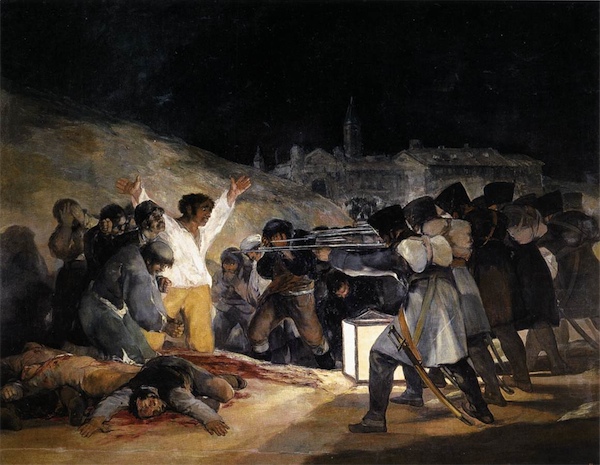
???’, ?? ?’ ???, ???? ??????? ?? ??????? ?????: ?? ??? ???????? ? ???? ???? ????? ?? ???????? ??? ?? ??????? ?????? ?????, ?????????? ??????? ???? ?? ????? ?????????, ??? ??? ????? ????????, ??? ?? ?? ??????????? ??? ????????? ??????, ??? ???? ??? ??????? ?? ??? ??????????????, ??????????? ?’ ??? ??? ??? ?????????, ????????? ???? ?????????, ?????????? ???? ???? ???????, “???? ????,” ???, “? ????????????, ?????????? ??? ????? ????????.”
Leontius, the son of Aglaion, was going up from the Piraeus along the outside of the North Wall when he saw some corpses lying at the executioners feet. He had an appetite to look at them but at the same time he was disgusted and turned away. For a time he struggled with himself and covered his face, but, finally overpowered by the appetite, he pushed his eyes wide open and rushed towards the corpses, saying, “Look for yourselves, you evil wretches, take your fill of the beautiful sight.”
—Plato (??????), Republic (????????) bk iv, 439e-440a (ca. 380 BCE)
This striking passage from the fourth book of Plato’s Republic has captivated scholars at least since the time of David Hume. In the twentieth century, Plato scholars have increasingly used it to present psychological interpretations of Plato’s political theory. What could it possibly have to do with American foreign policy in the last twenty-five years? Mark Danner explained it this way in our interview earlier this week focusing on his new book, Stripping the Body Bare:
Plato’s famous story about Leontius’ “divided soul”–though he doesn’t want to look at the freshly executed corpses, he finds himself forced to stare–seems to dovetail well with Leslie F. Manigat’s observation that political violence “strips bare the social body,” allowing us “to place the stethoscope and track the real life beneath the skin.” Manigat, who accepted power from the bloody hands of Duvalierist officers in the wake of 1987’s spectacularly violent aborted election, argues, in effect, that this is no bad thing: that Leontius should shed his guilt and look long and hard. For to understand the real workings of a society, one must find a way to see beneath the surface, and the most effective way to do that is through the portal of political violence. It is Manigat’s premise–and the premise of my book–that the interplay of class and power, of soldier and civilian, of history and contemporary struggle, that all of this and more can be seen most clearly during times of great upheaval, of revolution, coup d’état, of open class struggle and war.
Manigat the historian and political scientist showed himself a virtuoso at teasing out these subtle societal contradictions, in understanding the dynamics of Haiti’s “real life beneath the skin.” Alas, when he tried to profit from this knowledge as a practicing politician–when after a few months in the Palace he tried to become something other than a military-installed puppet by playing on the rivalries between the officers, the Duvalierist elite, and the Americans–he lost the game, and was overthrown and exiled in a coup d’état. His calculated risk that after the great bloodbath of the 1987 election the only road to the Palace led through the barracks, turned out to be only half true: Manigat had reached le fauteil–the presidential chair–but his attempt to use it as a tool in attaining true power failed badly. By accepting the Palace from the officers, he had alienated all those who should have been his allies: when the test of strength came and he needed support against the same soldiers and their guns, he had only himself and his own cleverness to draw on, and it was not enough.
Listen to Richard Strauss’s Tod und Verklärung, a tone poem for orchestra, op. 24 (1889) in a strong (though perhaps a bit sluggish) performance by the SWR Stuttgart Radio Symphony Orchestra under the baton of Sergiu Celibidache. Strauss composed this work without a specific poetic or graphic reference point–he relied entirely upon his own powerful imagination to provide a musical narrative for death and transfiguration. Sixty years later in one of his four final songs, Strauss quotes the central theme as the reference to death occurs in the last line. (Listen to Im Abendrot (1946) here). A bit more than two years later, as Strauss lay in his deathbed, he recalled the work to his daughter-in-law, Alice: “Dying is just as I composed it in Tod und Verklärung.”


